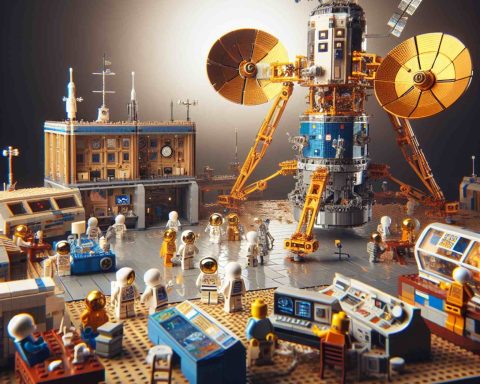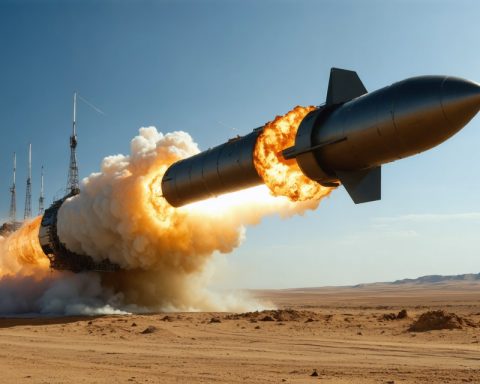- Virgin Galactic is preparing for the launch of its Delta-class spaceplane in 2026, marking a significant evolution in their capabilities.
- The Delta-class spaceplane will increase passenger capacity by 50% and launch frequency ninefold, enhancing revenue potential for space tourism.
- Expected monthly revenue from the new spaceplane could exceed $22 million, a substantial increase from previous earnings.
- The partnership with Redwire emphasizes a new focus on research payloads, with each vehicle accommodating up to 20 scientific experiments.
- This shift towards research missions could generate up to $20 million, surpassing the financial returns of tourist flights.
- By prioritizing innovation, Virgin Galactic aims to secure its position in the competitive space tourism market against rivals like Blue Origin and SpaceX.
As Virgin Galactic makes headlines with its latest innovations, it seems the company is pivoting towards a prosperous future in space. After its last flight with space tourists in June 2024, the focus has shifted to the upcoming Delta-class spaceplane, set to launch in 2026. This new marvel isn’t just an upgrade; it promises a remarkable 50% boost in passenger capacity and an astonishing ninefold increase in launch frequency. Imagine flying six passengers twice a week—this could revolutionize space tourism revenue, potentially generating over $22 million monthly compared to a meager million from previous flights.
But there’s more than just tourism on the horizon. A recent partnership with Redwire hints at a significant shift toward carrying research payloads. Each Delta spaceplane can hold up to 20 research lockers, capable of hosting scientific experiments crucial for lunar or Martian missions. This strategy opens a new revenue stream, possibly earning up to $20 million for transporting various research projects—far surpassing the income from a single tourist ticket.
As competition with emerging space tourism players heats up, such as Blue Origin and SpaceX, Virgin Galactic’s pivot away from traditional tourism could be a savvy move towards stability and growth in the ever-evolving landscape of space exploration. The big takeaway? Embracing innovation over competition may very well pave the way for Virgin Galactic’s profitable future in the cosmos.
Virgin Galactic: Charting New Frontiers in Space Tourism and Research
As Virgin Galactic makes strides towards a more prosperous future in space, details about their upcoming Delta-class spaceplane provide exciting insights into the company’s evolving strategy. This new spaceplane is not just an upgrade; it presents significant enhancements and new opportunities that could redefine both space tourism and scientific research.
New Features and Innovations
The Delta-class spaceplane is engineered to provide a 50% increase in passenger capacity, allowing for six passengers per flight. Furthermore, the anticipated launch frequency is expected to increase ninefold, with projections of flights occurring twice a week. This shift in capacity and frequency stands to substantially enhance Virgin Galactic’s revenue potential, with projected monthly earnings soaring to over $22 million.
Moreover, the Delta spaceplane is equipped to carry up to 20 research lockers, making it suitable for hosting pivotal scientific experiments aimed at supporting lunar and Martian exploration. This focus on research payloads could yield an impressive $20 million in revenue by facilitating various scientific projects, creating a lucrative revenue stream that surpasses traditional space tourism earnings.
Market Trends and Insights
The competitive landscape of space tourism is evolving rapidly. Virgin Galactic faces formidable challengers like Blue Origin and SpaceX, both of which are vying for a share of the burgeoning market. By pivoting towards research and innovation, Virgin Galactic not only strengthens its position against competition but also diversifies its income sources in an ever-changing environment.
Limitations and Challenges
However, transitioning from a purely tourism-focused model to one that emphasizes research carries inherent challenges. For instance, maintaining a balance between tourist flights and research missions while ensuring safety and compliance with regulations will be critical. Moreover, the company must continue developing partnerships and securing contracts for research projects, which can be unpredictable and competitive.
Pricing
With the increase in capacity and frequency, ticket prices for space tourism are likely to be adjusted. While previously priced at around $250,000 per seat, the expectation is that Virgin Galactic will leverage their enhanced offerings to potentially increase prices further, depending on demand and flight offerings.
Key Predictions
Looking ahead, it is plausible that Virgin Galactic could establish itself as a leader not only in space tourism but also in space-based research. Their strategic focus on innovation and diversifying revenue streams may lead to a sustainable, profitable model that capitalizes on the growing interest in space exploration.
Related Questions
1. What is the expected launch schedule for the Delta-class spaceplane?
– The Delta-class spaceplane is anticipated to begin operations in 2026, with plans for frequent launches—approximately twice a week.
2. How does Virgin Galactic’s revenue from research compare to tourism?
– The company could earn upwards of $20 million from research payloads, far exceeding the typical $1 million generated from a single tourist ticket, highlighting the potential financial benefits of this strategic pivot.
3. What impact might competition have on Virgin Galactic’s future?
– Competitive pressures from other space tourism companies may push Virgin Galactic to innovate further and expand its research capabilities, which could lead to increased partnerships and opportunities in the burgeoning space market.
For a deeper dive into Virgin Galactic and its initiatives, visit Virgin Galactic’s official website.











